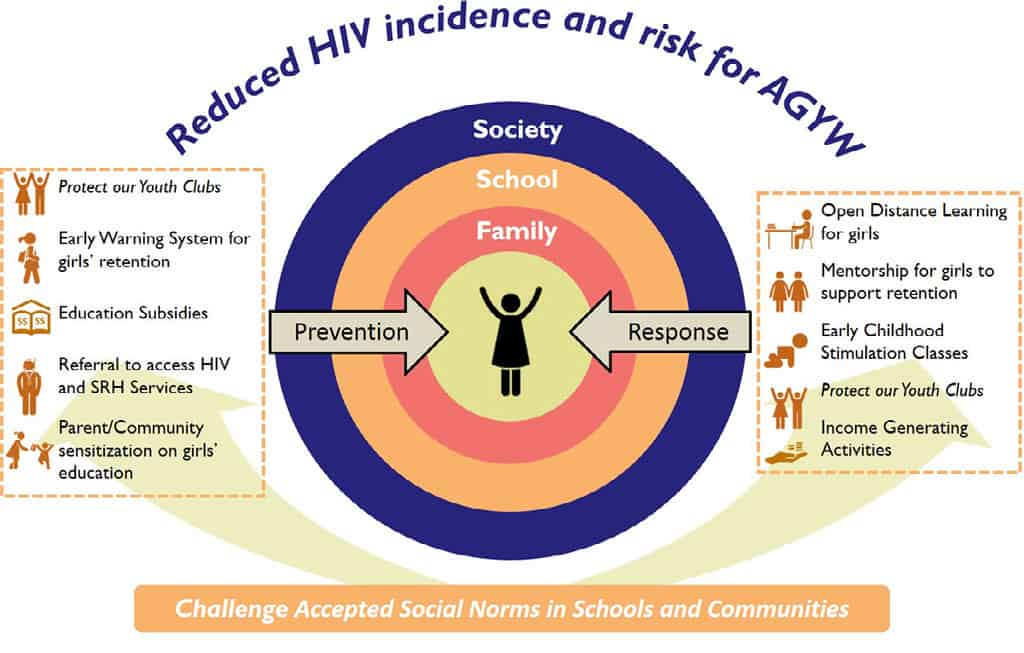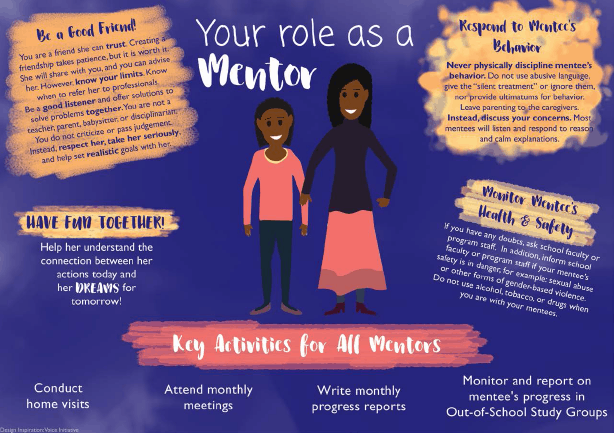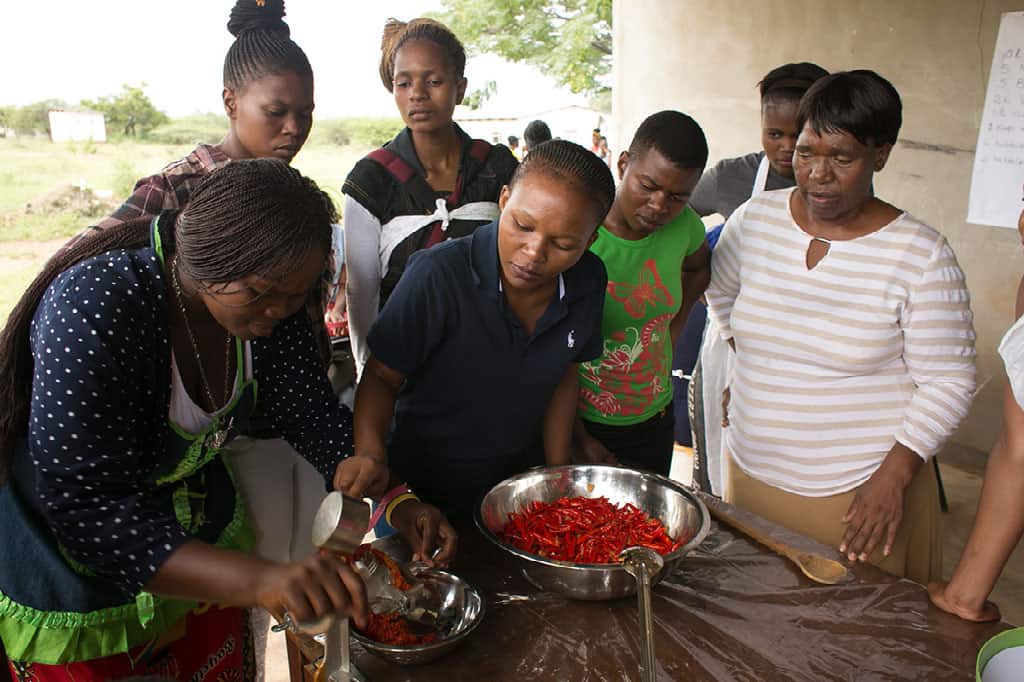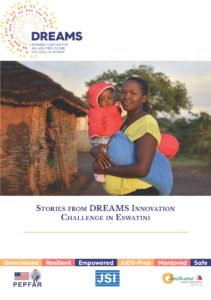This website uses cookies so that we can provide you with the best user experience possible. Cookie information is stored in your browser and performs functions such as recognizing you when you return to our website and helping our team to understand which sections of the website you find most interesting and useful.
DREAMS Innovation Challenge
Socio-ecological Model with Prevention and Response Arms
The program addressed the holistic needs of vulnerable in-school girls through a Prevention Arm and the comprehensive needs of out-of-school teen mothers through a Response Arm.

Responding to the Educational Needs of Pregnant Girls and Teen Mothers
Education: Giving girls a second chance
WEI/Bantwana partnered with the Ministry of Education and Training’s non-formal education partner, Emlalatini Development Center, to deliver non-formal education to 322 teen moms at two decentralized centers. The program delivered Emlalatini’s accredited curricula, recruiting high-performing local teachers to teach and prepare students for national examinations. The below videos provides insight from teachers educating teen moms.
The value for educating young girls is so important in the community. It reduces poverty in the community. When girls gets educated, you get employment and then you get the income which she uses to raise the child. And the child will also be able to go to school and the system continues in such a way. – Patrick Masuku, DREAMS Volunteer Teacher
Mentorship Program: “We walk together”
WEI/Bantwana’s Mentor Program was pivotal to the success of the overall program. Mentors were the “change agents” in the lives of the teen moms, keeping girls on their education pathway, trouble-shooting barriers to access, and interfacing with parents and community as advocates.

I still cannot believe that I re-matriculated as a young mother. My mentor made me believe that I am capable of doing anything and with her support I have believed in myself and my parents have started to believe in me again – Sakhile Vilakati
It is critically important for programs designed to reach teenage mothers to move beyond vertical programming to integrate mentorship and other wrap-around supports.
Protect Our Youth Program: Developing skills to navigate harmful gender norms and reduce gender-based vulnerabilities
The 24-session, evidence-based POY program is a skills-based curriculum that leveraged Population Council’s Building Assets Toolkit to identify and develop assets most needed by vulnerable Swazi AGYW. Girls develop a 5-year life plan (and identify barriers and responses to achieving it), and practice communication and negotiation skills to become more empowered around gender, sex, education, career, and more.
AGYW experienced statistically significant improvements across several composites, including positive gender norms, self-esteem, self-determination, peer pressure, desire to remain in school longer, and willingness to report GBV.
In our school, 20 girls dropped out of school due to pregnancy in 2013, but that has reduced to only 1 in the past year since the project was introduced and this girl was not part of the POY Club. I can safely say WEI/B has helped us a lot on that aspect – POY Peer Educator
Early Childhood Stimulation: Training vulnerable moms in nurturing care and nutrition
WEI/Bantwana delivered an 18-session evidence-based Early Childhood Stimulation (ECS) curriculum (adapted from WHO/UNICEF’s Care for Child Development) to train teen mothers to nurture, stimulate, feed and care for their babies. The curricula covers stimulation and nurturing care, nutrition and breastfeeding, Health, Water, Sanitation and Hygiene (WASH), child development, positive discipline and more.

Retaining Vulnerable Girls in School
WEI/Bantwana delivered the POY Program (detailed above) to build assets among vulnerable AGYW in-school and piloted an Early Warning System to identify and retain girls at risk of dropping out of school.
Early Warning System: Seeing the early signs of drop out and providing a robust response for retention
WEI/Bantwana’s Early Warning System (EWS) is grounded in the “ABCs” of risk behavior: Absenteeism, Behavior, and Course failure. Adapted from Creative International’s evidence-based model, the EWS identifies girls vulnerable to dropout and provides a Response Protocol to retain them in school. The Response Protocol includes student assessment and counseling, the development of an Academic Support Action Plan (ASAP!), and referrals to health and social services as needed.

Stories from DREAMS IC: Take a walk in the footsteps of our girls, mentors and teachers
Know what it takes for a young mother to succeed. Meet Noncedo Dlamini, a 22-year-old young mother enrolled in our alternative education classes in Eswatini

From 2016-2019, the Bantwana Initiative of World Education, Inc. (WEI/Bantwana) implemented the PEPFAR-funded DREAMS Innovation Challenge (DREAMS IC) project in Eswatini to increase resilience against the impacts of HIV. The project reached 1,800 vulnerable adolescent girls and young women (AGYW), including out-of-school teen moms, retaining girls in secondary school and providing education and comprehensive supports to girls who dropped out due to pregnancy.
This article was funded by a grant from the United States Department of State as part of the DREAMS Innovation Challenge, managed by JSI Research & Training Institute, Inc. (JSI). The opinions, findings, and conclusions stated here are those of the authors and do not necessarily reflect those of the United States Department of State or JSI.

